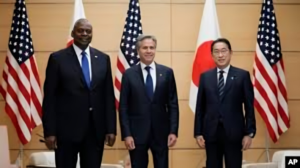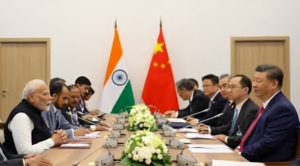America’s Strategic Gambit: Navigating Indo‑Pacific Alliances Amid Rising Bilateral Tensions
Introduction
In an era defined by shifting power dynamics and intensifying great‑power competition, the United States has redoubled efforts to solidify partnerships across the Indo‑Pacific region. Yet, as Senator Marco Rubio convenes with key allies and partners—from Japan and Australia to India and Southeast Asian nations—bilateral frictions threaten to overshadow his mission. Rising trade disputes, maritime dilemmas, and regional security concerns underscore the complexities of Washington’s outreach. This article delves into the strategic stakes of Rubio’s diplomatic tour, examines the underlying sources of tension, and assesses how the U.S. can reconcile competing priorities to maintain influence in a rapidly evolving theater.

Evolving Security Architecture
Building a cohesive security framework in the Indo‑Pacific requires balancing the ambitions of major regional players and safeguarding freedom of navigation in contested waters. Rubio’s delegation underscores:
- Quad Reinforcement
Coordinated drills and intelligence‑sharing among the U.S., Japan, Australia, and India have sent a strong deterrent signal to Beijing. Yet, disagreements over force posture and burden‑sharing linger beneath the surface. - ASEAN Engagement
Southeast Asian countries remain wary of choosing sides. Rubio’s overtures aim to reassure them that U.S. support will bolster, not hinder, their sovereignty. - Maritime Law and Disputes
Freedom of navigation operations challenge China’s expansive South China Sea claims. Some partners—like the Philippines—value U.S. backing, while others fear Beijing’s economic reprisals.
Key Challenges in Security Cooperation
- Rules of Engagement: Divergent threat perceptions—some allies see China as an existential rival, others as a strategic partner—complicate the formulation of joint protocols.
- Logistics and Basing Rights: Negotiations over access to ports and airfields have stalled in certain states due to domestic political pressures.
- Technology Sharing: Advanced systems (e.g., missile defense, hypersonics) require trust; concerns over intellectual property and non‑proliferation slow down agreements.

Economic and Trade Frictions
Senator Rubio’s discussions on trade liberalization and infrastructure investment are clouded by growing bilateral spats:
- Tariff Tussles: The U.S. and some partners have slapped reciprocal tariffs on goods ranging from semiconductors to agricultural produce. Domestic political pressures drive protectionist measures, undermining negotiations.
- Digital Economy Regulations: Divergent data‑localization laws and cybersecurity standards complicate e‑commerce frameworks. U.S. tech firms push for open data flows, while partners emphasize national security and privacy.
- Debt‑Trap Diplomacy Concerns: Infrastructure financing—particularly via China’s Belt and Road Initiative—has saddled smaller states with unsustainable debt. Rubio’s pitch of transparent, sustainable funding faces competition from faster Chinese loans.
Strategies to Mitigate Economic Tensions
- Negotiated Tariff Reductions: Establish clear roadmaps with phased tariff rollbacks tied to verifiable trade‑facilitation benchmarks.
- Digital Cooperation Frameworks: Launch working groups to harmonize data‑privacy standards, drawing on existing models like the U.S.‑EU Privacy Shield.
- Alternative Financing Vehicles: Propose multilateral development banks and private‑sector consortia to rival Chinese state‑backed loans, accompanied by capacity‑building grants.
Human‑Centered Diplomacy
Beyond hard power, Rubio’s agenda emphasizes people‑to‑people links:
- Educational Exchanges: Scholarships and research collaborations foster mutual understanding. However, visa backlogs and security screenings have dampened enthusiasm among prospective students and academics.
- Public Health Partnerships: In the wake of COVID‑19, joint efforts on vaccine development and distribution enhance goodwill. Disputes over patent waivers and supply‑chain resilience remain flashpoints.
- Climate Resilience Initiatives: Small island nations face existential threats from rising seas. U.S. funding for green technology and disaster preparedness offers tangible benefits, though partners seek long‑term commitment beyond one‑off grants.
Action Points for Strengthening Soft Power
- Expand regional Fulbright programs and streamline visa processes.
- Create joint health task forces with clear mandates for emergency response.
- Establish a permanent climate fund with transparent governance and local stakeholder input.
Conclusion
As Senator Marco Rubio’s tour of Indo‑Pacific capitals underscores, the United States confronts a delicate balancing act: reaffirming alliances in the face of Chinese assertiveness, while managing bilateral disagreements that could erode trust. Success will depend on pragmatic diplomacy—crafting win‑win solutions on security, trade, and development—grounded in genuine partnership rather than unilateral demands. Only by addressing both the strategic and human dimensions of cooperation can the U.S. hope to sustain its influence and foster a stable, prosperous Indo‑Pacific order.